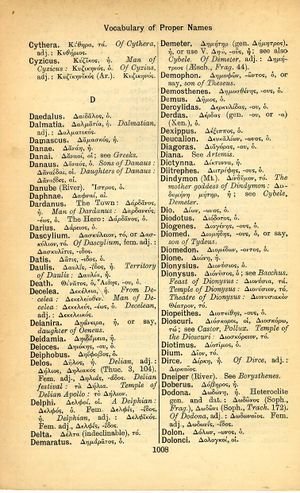Diagoras: Difference between revisions
Γαστρὸς δὲ πειρῶ πᾶσαν ἡνίαν κρατεῖν → Frenis regendus venter adductis tibi est → Mit straffem Zügel such' zu lenken deinen Bauch
m (Text replacement - "link={{" to "link={{") |
m (Text replacement - "}}]]" to "}}]]") |
||
| Line 1: | Line 1: | ||
{{WoodhouseENELnames | {{WoodhouseENELnames | ||
|Text=[[File:woodhouse_1008.jpg|thumb | |Text=[[File:woodhouse_1008.jpg|thumb | ||
|link={{filepath:woodhouse_1008.jpg | |link={{filepath:woodhouse_1008.jpg}}]]Διαγόρας, -ου, ὁ. | ||
}} | }} | ||
{{Lewis | {{Lewis | ||
Revision as of 10:11, 15 August 2017
English > Greek (Woodhouse)
Διαγόρας, -ου, ὁ.
Latin > English (Lewis & Short)
Dĭăgŏras: ae, m., Διαγόρας.
I An atheistic philosopher and poet of Melos, a contemporary of Pindar, Cic. N. D. 1, 1; 1, 23; 42; 3, 37; Val. Max. 1, 2.—
II One of the most famous athletes in the Olympic games, a native of Rhodes, Cic. Tusc. 1, 46, 111; Gell. 3, 15, 3.
Latin > French (Gaffiot 2016)
Dĭăgŏrās, æ, m. (Διαγόρας),
1 philosophe de Mélos : Cic. Nat. 1, 2
2 Rhodien, qui mourut de joie en voyant ses deux fils couronnés le même jour à Olympie : Cic. Tusc. 1, 111
3 nom d’un médecin : Plin. 1, 12.
Latin > German (Georges)
Diagorās, ae, m. (Διαγόρας), I) ein Dichter u. Philosoph aus Melos (Melius), mit dem Beinamen Ἄθεος Zeitgenosse des Pindar u. Simonides, Cic. de nat. deor. 1, 2. Lact. 1, 2, 2. Min. Fel. 8, 2. – II) ein berühmter Athlet aus Rhodus, Zeitgenosse des Pindar, in dessen Gegenwart zwei seiner Söhne als Hieroniken zu Olympia gekrönt wurden, Cic. Tusc. 1, 111. Gell. 3, 15, 3.

